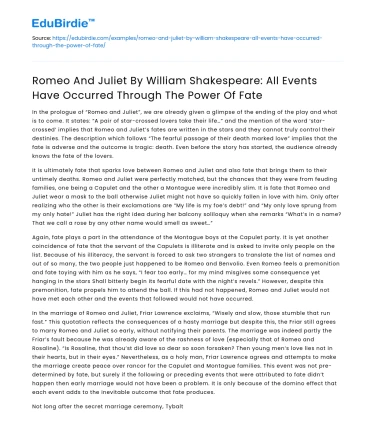In the prologue of “Romeo and Juliet”, we are already given a glimpse of the ending of the play and what is to come. It states: “A pair of star-crossed lovers take their life…” and the mention of the word ‘star-crossed’ implies that Romeo and Juliet’s fates are written in the stars and they cannot truly control their destinies. The description which follows “The fearful passage of their death marked love” implies that the fate is adverse and the outcome is tragic: death. Even before the story has started, the audience already knows the fate of the lovers.
It is ultimately fate that sparks love between Romeo and Juliet and also fate that brings them to their untimely deaths. Romeo and Juliet were perfectly matched, but the chances that they were from feuding families, one being a Capulet and the other a Montague were incredibly slim. It is fate that Romeo and Juliet wear a mask to the ball otherwise Juliet might not have so quickly fallen in love with him. Only after realizing who the other is their exclamations are “My life is my foe’s debt!” and “My only love sprung from my only hate!” Juliet has the right idea during her balcony soliloquy when she remarks “What’s in a name? That we call a rose by any other name would smell as sweet…”
Save your time!
We can take care of your essay
- Proper editing and formatting
- Free revision, title page, and bibliography
- Flexible prices and money-back guarantee
Again, fate plays a part in the attendance of the Montague boys at the Capulet party. It is yet another coincidence of fate that the servant of the Capulets is illiterate and is asked to invite only people on the list. Because of his illiteracy, the servant is forced to ask two strangers to translate the list of names and out of so many, the two people just happened to be Romeo and Benvolio. Even Romeo feels a premonition and fate toying with him as he says, “I fear too early… for my mind misgives some consequence yet hanging in the stars Shall bitterly begin its fearful date with the night’s revels.” However, despite this premonition, fate propels him to attend the ball. If this had not happened, Romeo and Juliet would not have met each other and the events that followed would not have occurred.
In the marriage of Romeo and Juliet, Friar Lawrence exclaims, “Wisely and slow, those stumble that run fast.” This quotation reflects the consequences of a hasty marriage but despite this, the Friar still agrees to marry Romeo and Juliet so early, without notifying their parents. The marriage was indeed partly the Friar’s fault because he was already aware of the rashness of love (especially that of Romeo and Rosaline). “Is Rosaline, that thou’st did love so dear so soon forsaken? Then young men’s love lies not in their hearts, but in their eyes.” Nevertheless, as a holy man, Friar Lawrence agrees and attempts to make the marriage create peace over rancor for the Capulet and Montague families. This event was not pre-determined by fate, but surely if the following or preceding events that were attributed to fate didn’t happen then early marriage would not have been a problem. It is only because of the domino effect that each event adds to the inevitable outcome that fate produces.
Not long after the secret marriage ceremony, Tybalt provokes a fight with Romeo but Romeo is indeed sensible enough to withdraw as he is aware that Tybalt is Juliet’s cousin and he has made a vow of marriage only one day ago. However, after Mercutio duels with Tybalt, he cries out “A plague on both your families!”, also a premonition of the outcome; losses for both the Capulets and Montagues. Romeo is then so angry at Mercutio’s death that he slays Tybalt and cries out “O I am fortune’s fool!”. Surely these events have all occurred through the power of fate.






 Stuck on your essay?
Stuck on your essay?

